Wgu c217 chapters 10 12 - Study guides, Class notes & Summaries
Looking for the best study guides, study notes and summaries about Wgu c217 chapters 10 12? On this page you'll find 11 study documents about Wgu c217 chapters 10 12.
All 11 results
Sort by
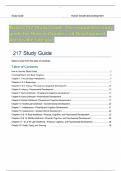
-
WGU C217 Study Guide; The completed study guide for Human Growth and Development Across the Lifespan
- Exam (elaborations) • 35 pages • 2024
-
- $16.99
- + learn more
WGU C217 Study Guide; The completed study guide for Human Growth and Development Across the Lifespan Table of Contents How to Use this Study Guide 2 Coaching Report and Book Chapters 3 Chapter 1: The Life-Span Perspective 4 Chapters 2 & 3: Beginnings 7 Chapters 4 & 5: Infancy—Physical and Cognitive Development 10 Chapter 6: Infancy—Psychosocial Development 13 Chapter 7: Early Childhood—Physical and Cognitive Development 14 Chapter 8: Early Childhood—Psychosocial Development 15 ...
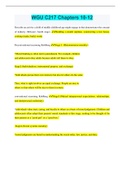
-
WGU C217 Chapters 10-12
- Exam (elaborations) • 4 pages • 2022
- Available in package deal
-
- $8.49
- + learn more
WGU C217 Chapters 10-12 Describe an activity a child of middle childhood age might engage in that demonstrates the concept of industry (Erikson's fourth stage). Building a model airplane, constructing a tree house, cooking (make, build, work) Preconventional reasoning Kohlberg Stage 1: (Heteronomous morality) *Moral thinking is often tied to punishment. For example, children and adolescents obey adults because adults tell them to obey. Stage2:(Individualism, instrumental purpose, and exchan...
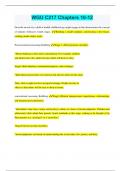
-
WGU C217 Chapters 10-12
- Exam (elaborations) • 4 pages • 2024
-
- $9.79
- + learn more
WGU C217 Chapters 10-12 Describe an activity a child of middle childhood age might engage in that demonstrates the concept of industry (Erikson's fourth stage). Building a model airplane, constructing a tree house, cooking (make, build, work) Preconventional reasoning Kohlberg Stage 1: (Heteronomous morality) *Moral thinking is often tied to punishment. For example, children and adolescents obey adults because adults tell them to obey. Stage2:(Individualism, instrumental purpose, and exc...

-
WGU C217 Chapters 10-12(verified answers )latest update
- Exam (elaborations) • 3 pages • 2022
- Available in package deal
-
- $8.49
- + learn more
WGU C217 Chapters 10-12(verified answers )latest updateDescribe an activity a child of middle childhood age might engage in that demonstrates the concept of industry (Erikson's fourth stage). Building a model airplane, constructing a tree house, cooking (make, build, work) Preconventional reasoning Kohlberg Stage 1: (Heteronomous morality) *Moral thinking is often tied to punishment. For example, children and adolescents obey adults because adults tell them to obey. Stage2:(Indi...
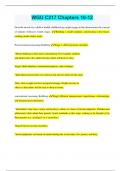
-
WGU C217 Chapters 10-12
- Exam (elaborations) • 4 pages • 2023
-
- $5.49
- + learn more
Describe an activity a child of middle childhood age might engage in that demonstrates the concept of industry (Erikson's fourth stage). Building a model airplane, constructing a tree house, cooking (make, build, work) Preconventional reasoning Kohlberg Stage 1: (Heteronomous morality) *Moral thinking is often tied to punishment. For example, children and adolescents obey adults because adults tell them to obey. Stage2:(Individualism, instrumental purpose, and exchange) *Individuals purs...
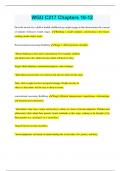
-
WGU C217 Chapters 10-12
- Exam (elaborations) • 4 pages • 2023
-
- $8.49
- + learn more
Describe an activity a child of middle childhood age might engage in that demonstrates the concept of industry (Erikson's fourth stage). Building a model airplane, constructing a tree house, cooking (make, build, work) Preconventional reasoning Kohlberg Stage 1: (Heteronomous morality) *Moral thinking is often tied to punishment. For example, children and adolescents obey adults because adults tell them to obey. Stage2:(Individualism, instrumental purpose, and exchange) *Individuals purs...
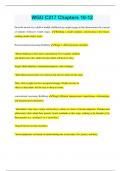
-
WGU C217 Chapters 10-12
- Exam (elaborations) • 4 pages • 2024
-
- $7.09
- + learn more
Describe an activity a child of middle childhood age might engage in that demonstrates the concept of industry (Erikson's fourth stage). Building a model airplane, constructing a tree house, cooking (make, build, work) Preconventional reasoning Kohlberg Stage 1: (Heteronomous morality) *Moral thinking is often tied to punishment. For example, children and adolescents obey adults because adults tell them to obey. Stage2:(Individualism, instrumental purpose, and exchange) *Individuals purs...
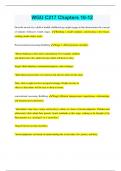
-
WGU C217 Chapters 10-12
- Exam (elaborations) • 4 pages • 2024
-
- $12.39
- + learn more
Describe an activity a child of middle childhood age might engage in that demonstrates the concept of industry (Erikson's fourth stage). Building a model airplane, constructing a tree house, cooking (make, build, work) Preconventional reasoning Kohlberg Stage 1: (Heteronomous morality) *Moral thinking is often tied to punishment. For example, children and adolescents obey adults because adults tell them to obey. Stage2:(Individualism, instrumental purpose, and exchange) *Individuals purs...
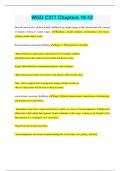
-
WGU C217 Chapters 10-12
- Exam (elaborations) • 4 pages • 2024
-
- $12.89
- + learn more
Describe an activity a child of middle childhood age might engage in that demonstrates the concept of industry (Erikson's fourth stage). Building a model airplane, constructing a tree house, cooking (make, build, work) Preconventional reasoning Kohlberg Stage 1: (Heteronomous morality) *Moral thinking is often tied to punishment. For example, children and adolescents obey adults because adults tell them to obey. Stage2:(Individualism, instrumental purpose, and exchange) *Individuals purs...
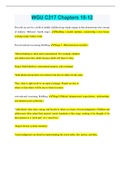
-
WGU C217 Chapters 10-12
- Exam (elaborations) • 4 pages • 2023
-
- $4.49
- + learn more
Describe an activity a child of middle childhood age might engage in that demonstrates the concept of industry (Erikson's fourth stage). Building a model airplane, constructing a tree house, cooking (make, build, work) Preconventional reasoning Kohlberg Stage 1: (Heteronomous morality) *Moral thinking is often tied to punishment. For example, children and adolescents obey adults because adults tell them to obey. Stage2:(Individualism, instrumental purpose, and exchange)

Did you know that on average a seller on Stuvia earns $82 per month selling study resources? Hmm, hint, hint. Discover all about earning on Stuvia


